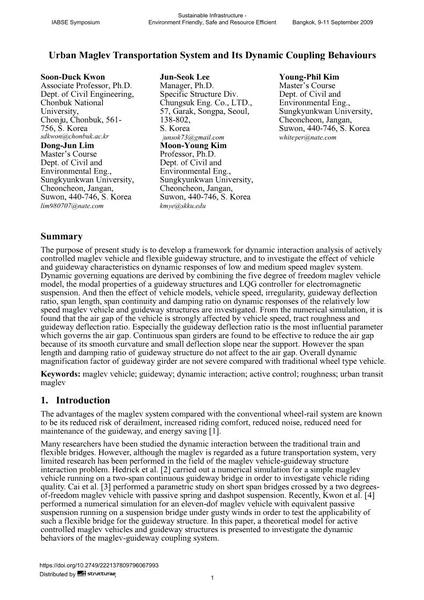Urban Maglev Transportation System and Its Dynamic Coupling Behaviours

|
|
|||||||||||
Bibliografische Angaben
| Autor(en): |
Soon-Duck Kwon
Jun-Seok Lee Young-Phil Kim Dong-Jun Lim Moon-Young Kim |
||||
|---|---|---|---|---|---|
| Medium: | Tagungsbeitrag | ||||
| Sprache(n): | Englisch | ||||
| Tagung: | IABSE Symposium: Sustainable Infrastructure - Environment Friendly, Safe and Resource Efficient, Bangkok, Thailand, 9-11 September 2009 | ||||
| Veröffentlicht in: | IABSE Symposium Bangkok 2009 | ||||
|
|||||
| Seite(n): | 54-61 | ||||
| Anzahl der Seiten (im PDF): | 8 | ||||
| Jahr: | 2009 | ||||
| DOI: | 10.2749/222137809796067993 | ||||
| Abstrakt: |
The purpose of present study is to develop a framework for dynamic interaction analysis of actively controlled maglev vehicle and flexible guideway structure, and to investigate the effect of vehicle and guideway characteristics on dynamic responses of low and medium speed maglev system. Dynamic governing equations are derived by combining the five degree of freedom maglev vehicle model, the modal properties of a guideway structures and LQG controller for electromagnetic suspension. And then the effect of vehicle models, vehicle speed, irregularity, guideway deflection ratio, span length, span continuity and damping ratio on dynamic responses of the relatively low speed maglev vehicle and guideway structures are investigated. From the numerical simulation, it is found that the air gap of the vehicle is strongly affected by vehicle speed, tract roughness and guideway deflection ratio. Especially the guideway deflection ratio is the most influential parameter which governs the air gap. Continuous span girders are found to be effective to reduce the air gap because of its smooth curvature and small deflection slope near the support. However the span length and damping ratio of guideway structure do not affect to the air gap. Overall dynamic magnification factor of guideway girder are not severe compared with traditional wheel type vehicle. |
||||
